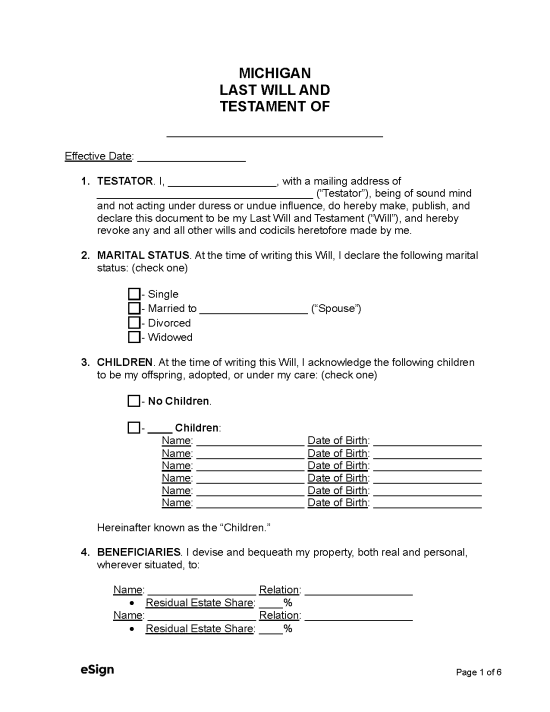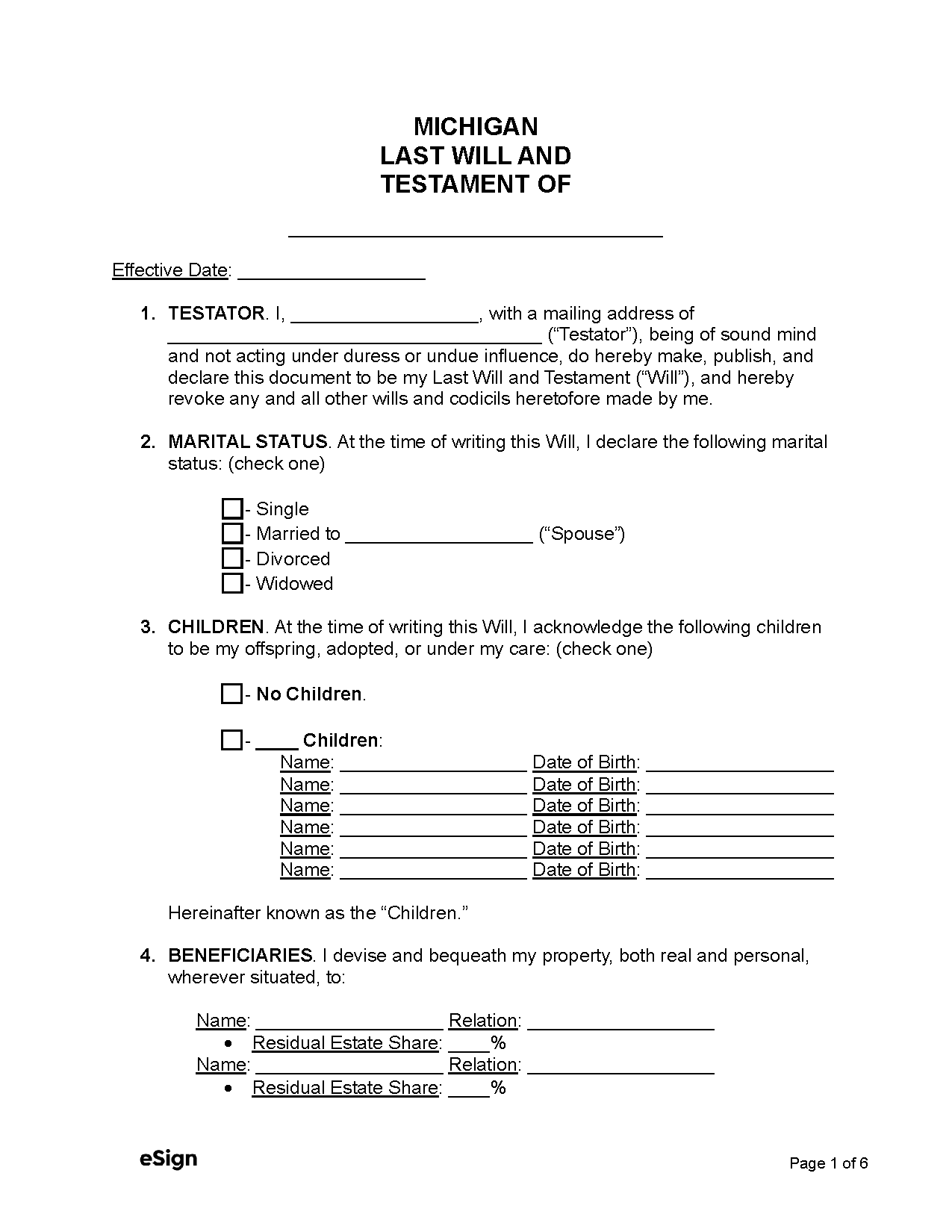State Laws
Individuals must be 18 years or older and of sufficient mental capacity to draft a will.[1]
Holographic Wills – A holographic or handwritten will is valid if it is signed and dated by the testator and is in their handwriting.[2]
Revocation – A will is revoked if destroyed by the testator (or at their direction) or if a new will is drafted.[3]
Signing Requirements – A will is valid if signed by the testator and two witnesses.
Probate Process in Michigan (5 steps)
An application to start the informal probate process (i.e., unsupervised by the court) must be sent within 28 days of the death of the testator (will creator). If after 28 days, no one applies, anyone with a claim to the estate or issue that would require probate can start the process.[4]
The following is meant to be a general overview of the probate process. It is recommended that executors/personal representatives consult with an attorney if they’re unsure of any step.
1. Filing Application
To begin informal probate and appoint a personal representative, an interested person (e.g., an individual designated in the will, a beneficiary, or creditor) must file the following with the probate court of the county where the decedent lived:[7],[8]
-
Application for Informal Probate and/or Appointment of Personal Representative – This form requests informal probate and authority to act as personal representative.
- Testimony to Identify Heirs – This form is used to identify the decedent’s heirs and must be filed at the same time as the Application.[9]
- Supplemental Testimony to Identify Nonheir Devisees – This form identifies devisees who are not heirs.
-
Death certificate – The death certificate must be filed within 14 days of filing the Application.
-
Original will – The original last will and testament must be filed with the probate court within 14 days of filing the Application.
-
Filing fee – A fee of $170.00 is required (the fee may vary per county).[10]
If the applicant doesn’t have priority of appointment, they must file the below forms:
- Notice of Intent to Request Informal Appointment of Personal Representative – Copies of this notice and the Application must be served on those with prior or equal right to appointment.[11]
-
Proof of Service – This form records the documents served by the applicant to other parties.
2. Accept Appointment
Once confirmation of the accepted Application has been received, the personal representative should complete and file the Acceptance of Appointment.[12] The court will execute a Register’s Statement and Letters of Authority of Personal Representative as well, giving the personal representative full authority to administer the estate.
3. Post Bond (If Applicable)
Anyone with an interest in the estate that is greater than $2,500 can demand that the personal representative post bond. The will can also state this demand.[13] If a demand is made, the personal representative must refrain from their duties until a bond is posted and the Bond of Fiduciary is filed.
If bond is not posted within 29 days of the demand, the personal representative may be discharged from their position.
4. File Inventory
The personal representative is responsible for filing the Inventory and providing copies to interested parties.[14] Based on the estate’s value as documented in the Inventory, the court will determine the inventory fee to be paid.[15]
5. Notice to Creditors
After filing the Inventory and Proof of Service, the personal representative must deliver the following notices to the appropriate parties:
- Account of Fiduciary – This form tracks the estate’s assets and transactions and must be served on interested parties and filed with the court.[17]
- Notice to Friend of the Court – This form must be provided to a “Friend of the Court” (an entity advising the court).[18]
- Notice of Appointment – This notice must be served on interested parties within 14 days of the personal representative’s appointment.[19]
- Notice to Creditors – This document must be submitted to a local newspaper for publication.[20]
- Notice to Known Creditors – The personal representative must serve copies of this form on known creditors and file the original with the court.
- Notice of Continued Administration –This form must be filed yearly within 28 days of the appointment date’s anniversary if the estate has been open for over a year.[21]
A Proof of Service demonstrating that the Account of Fiduciary, Notice to Friend of the Court, and Notice of Appointment were served on interested parties must be submitted to the probate court.
6. Close Estate
The personal representative will need to settle the estate’s bills, debts, and claims (using the estate’s funds), as well as file the decedent’s final tax return. Due to changes in federal law, estate taxes no longer apply.[22]
The estate may then be closed once five months have passed since its opening and the time limit for creditors to present claims has expired (four months from the Notice to Creditors‘ publication).[23]
To close the estate, the personal representative must file and serve the Sworn Statement to Close Unsupervised Administration on all interested parties. The court will issue the Certificate of Completion to confirm that the Sworn Statement has been processed and that the estate is formally closed.[24]
Sources
- § 700.2501
- § 700.2502
- § 700.2507
- § 700.3301
- § 700.3203(g)
- § 700.3983
- § 700.3201
- § 700.1105(a)
- Rule 5.302
- Probate Court Fee Tables
- § 700.3310
- Unsupervised Probate Packet Informal
- § 700.3605
- § 700.3706
- § 600.871
- Rule 5.307
- § 700.3954
- § 700.3705(6)
- Rule 5.304(A)
- Rule 5.208
- § 700.3951
- Estate Tax Forms
- § 700.3803
- § 700.3958

